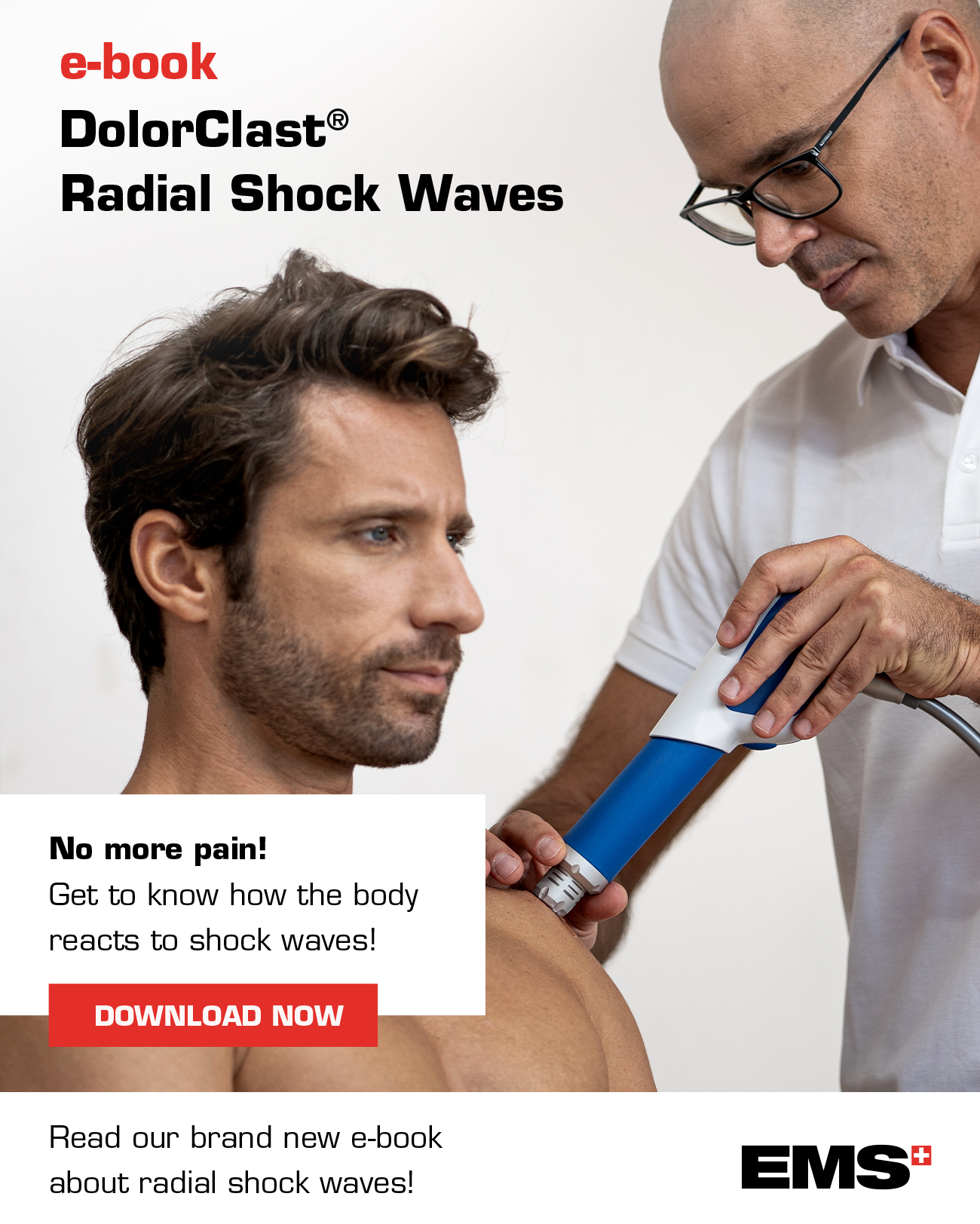What is DolorClast® Radial Shock Waves?
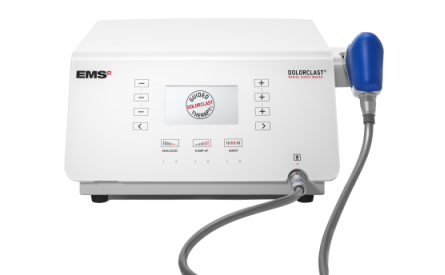
In 1997, EMS patented the first radial shock wave device, the Swiss DolorClast®, based on the ballistic principle.
Compressed air sent to the handpiece accelerates a projectile, which strikes a fixed applicator at high speed (up to 90 km/h). The kinetic energy resulting from this movement is converted into a shock wave transmitted in a radial manner to the targeted tissues.
Shock waves delivery is short in time, usually lasting just a few minutes, thus enabling to be coupled with other therapies within the same session as recommended by the GDT. DolorClast® Shock wave protocol usually includes a total of three to five sessions, planned at a rate of one to two sessions per week with an interval of minimum 72h between them.
Use DolorClast® Radial Shock Waves for:
- For superficial indications
- Sub-acute or chronic pathologies
- 1st choice to address calcaneal tendinopathies & entesopathies, fasciopathies, myotendinous tears, muscular pathologies, trigger points and spastic tissues.
What are the benefits of shock wave therapy?

Extracorporeal Shock Wave Therapy (ESWT) is the application of Shock Waves in medicine.
It is clinically proven that pressure waves, when applied to injured tissues, stimulate metabolic reactions:
- Reduction of pain felt by nerve fibers
- Increase of blood circulation in surrounding soft tissues
- Beginning of healing process triggered by stem cells activation
The sound of healing with radial shock waves
How can shock wave therapy help in physical therapy?
How to be effective with shock wave therapy?
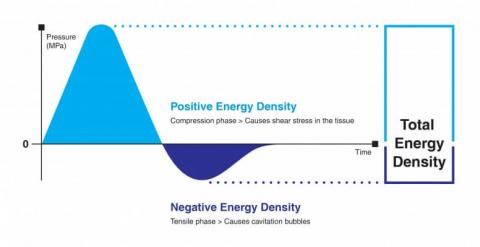
It`s easy: the more energy delivered into the tissue, the better the therapeutic outcome. For this, we know the following:
“A significant tissue effect is cavitation consequent to the negative phase of the wave propagation ” (Ogden et al., 2001)
“Both parameters (Compression phase and Cavitation) may have important consequences for therapeutic bioeffect” (Perez et al., 2014)
“The contribution of cavitation to the therapeutic effect of radial shock waves was recently shown in an advanced animal model ” (Angstman et al., 2015)
Radial shock waves visualization
The compression phase (P+) penetrates the skin and weakens the tissue.
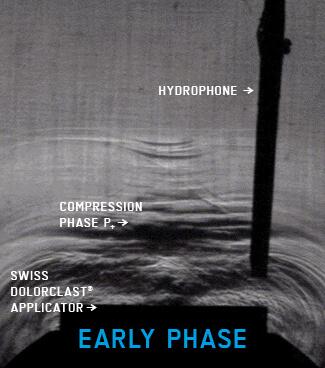
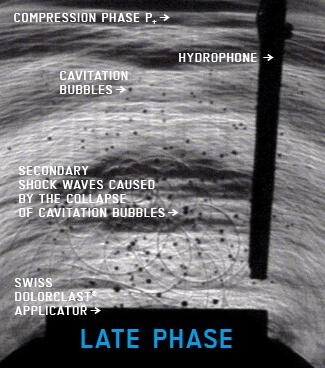
A tensile phase (P-) follows generating
cavitation bubbles.
These bubbles collapse causing secondary shock waves.
Which shock wave devices gives the most cavitation?
The pictures below represent the maximum level of cavitation (black dots) generated with different radial shock waves handpieces at maximum pressure settings at 15Hz.1

1 NikolausB. M. Császár et al., “Radial Shock Wave Devices Generate Cavitation”, 2015.
Given that DolorClast® Radial Shock Waves delivers the highest energy density, no wonder that it generates the highest amount of cavitation in the treated tissues.
Why is consistent energy delivery so important?
Comparison of energy delivered at increasing frequencies:
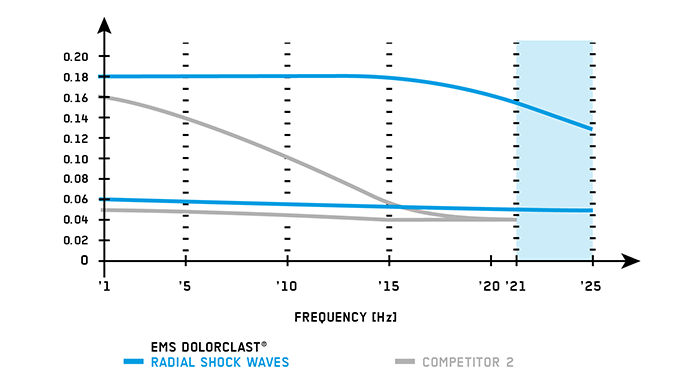
Shock Wave therapy is dose dependent. However, as you increase the frequency of shock waves generated, not all devices and handpieces can sustain the same energy delivery at higher frequencies.
Bench studies1 demonstrate that the DolorClast® Radial Shock Waves delivers up to 200% more energy density than competing devices at frequencies of 15 Hz and above and maximum pressure.
1 Internal bench study comparison of energy density between the DolorClast Radial Shock Waves (EMS) and the best device among competition.
DolorClast® Radial Shock Waves is 3x more powerful at 15Hz than other devices
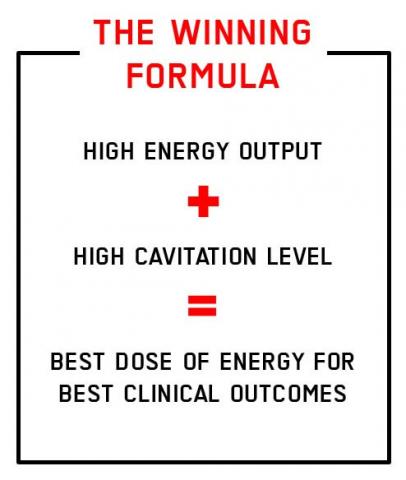
Clinical researches1 show that therapeutic effects of RSWT® are linked to the level of cavitation produced in the treated tissues.
And, a high cavitation level is a result of a high amount of energy density delivered by the devices’ handpieces.
The higher the total of the energy density is, the better the treatment outcomes will be.
1 Perez et al., 2014 / Angstman et al., 2015 / Ogden et al., 2001 / Maier et al., 2003 / Hausdorf et al., 2008.
How do radial shock waves work?

Red chili peppers contain capsaicin. At first this substance overwhelms the so-called C nerve fibers responsible for transmitting pain but then disables them for an extended period of time.
Everybody knows the feeling – first, the mouth is on fire, then it feels completely numb. Research has indicated that shock wave therapy works the same way1.
1 Maier et al., Clin Orthop Relat Res 2003; (406):237–245.
Pain therapy in 4 steps:
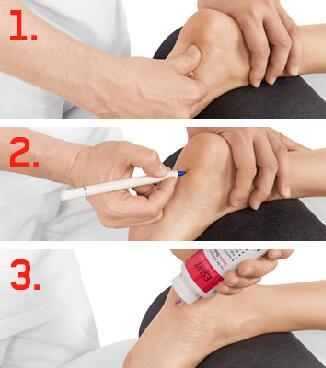
1. Palpate
Locate the area of pain through palpation and biofeedback.
2. Mark
Mark the area of pain.
3. Apply gel
Apply coupling gel to transmit shock waves to the tissue.
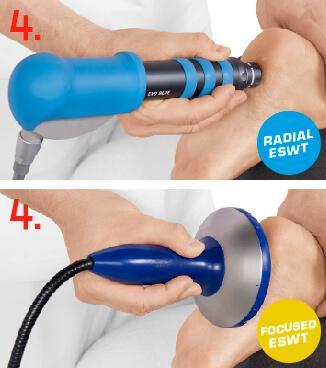
4. Apply shock waves
Deliver Radial or Focused Shock Waves to the area of pain while keeping the applicator firmly in place on the skin.
DolorClast® Radial Shock Waves
The Swiss original in worldwide pain treatment
34 / 62 Randomized Controlled Trials
Used in more studies listed in the PEDro database than any other ESWT device
Over 13,000 Units in Use
Worldwide
More than 100 Million Patients
Treated Worldwide
Guided DolorClast Therapy suggests a combination therapy approach:
Apply DolorClast® Radial Shock Waves:
OR
Download our e-book on the DolorClast® Radial Shock Waves
